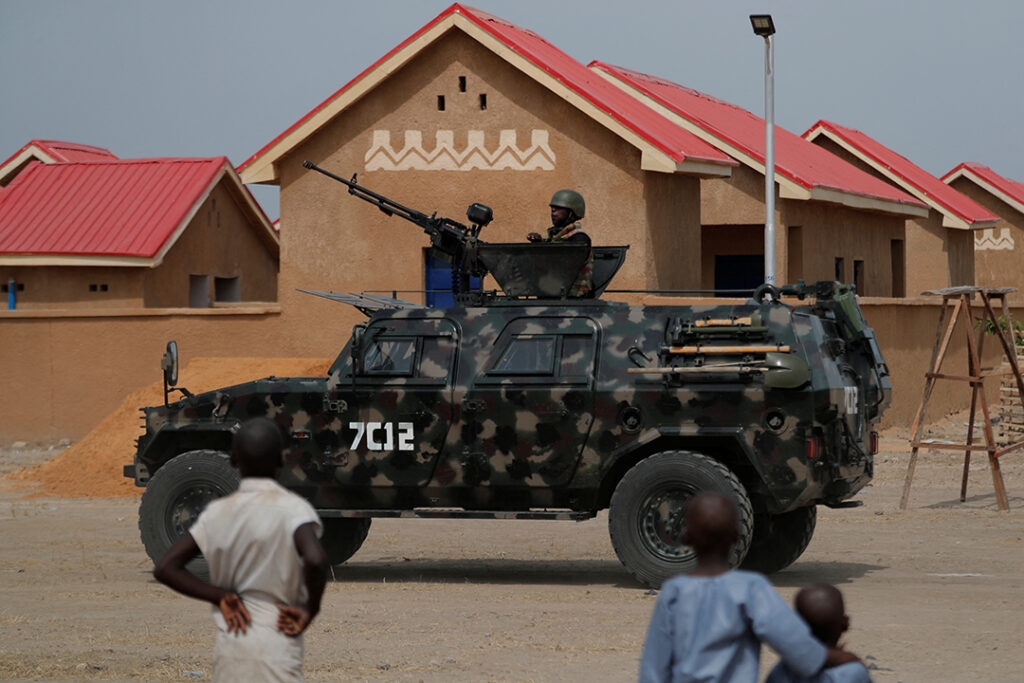ADF STAFF
More than 200 Boko Haram fighters and some of their commanders surrendered to Nigerian troops after the Islamic State West Africa Province (ISWAP) launched an attack on the rival extremist group in northeast Borno State.
It was the latest in a series of clashes between the groups since 2020, when ISWAP launched attacks that led to the death of Abubakar Shekau, Boko Haram’s leader.
Infighting between ISWAP, Boko Haram and its faction Jama’atu Ahlis Sunna Lidda’awati wal-Jihad (JAS) benefits the efforts of the Multinational Joint Task Force (MNJTF) to restore peace to the area. The 10,000-man MNJTF is a military effort meant to defeat militants in the Lake Chad region. It includes troops from Benin, Cameroon, Chad, Niger and Nigeria, all of which are targeted by the terrorist groups.
“There is serious infighting between ISWAP and JAS criminal groups,” Maj. Gen. Abdul-Khalifah Ibrahim, commander of the MNJTF, told African Arguments. “We welcome this and hope it escalates. The criminals are being killed, [their] supplies are being cut off and equipment is being recovered. The MNJTF has made significant gains and we hope to make more.”
Vengeance was behind the late January attack as JAS fighters killed at least 35 ISWAP members during an ambush in the Lake Chad basin weeks earlier. The groups have turned on each other as they face mounting pressure from the MNJTF and Nigerian forces.
Over a two-week period in August and September 2022, Nigeria’s military said it killed more than 250 Boko Haram and ISWAP fighters through air strikes and ground operations. After those attacks, 556 people linked to the groups surrendered to the military. Troops also recovered grenades, AK-47 rifles, grenade launchers and ammunition.
As African Arguments reported, Boko Haram and ISWAP are known for their strategic differences. ISWAP typically conducts large-scale attacks on military camps and oil sites.
Boko Haram and its offshoot groups commonly raid villages, indiscriminately killing civilians, and kidnapping women and children. The United Nations estimated that 350,000 people have been killed in connection with Boko Haram’s insurgency in northern Nigeria since 2009, while more than 2 million others have been displaced.
Recent losses incurred by Boko Haram have led some observers to wonder how long the group will endure.
“Overall, the trendline points to Boko Haram being at a turning point,” wrote researcher Ana Aguilera for the European Eye on Radicalization. “The group might find a way of recalculating its tactics to deal with the loss of its leader and the reduction of its revenue streams, or it might wither under the dual campaign of ISWAP trying to poach its members and the Nigerian state offering paths to demobilization. …”
In 2022, the MNJTF announced it had killed more than 1,000 Boko Haram fighters during land, sea and air offensives as part of an effort codenamed Operation Lake Sanity. Ibrahim told African Arguments that his troops also killed more than 45 Boko Haram fighters in January.
However, experts warn the groups have proven to be resilient and still have some areas where they operate more freely. “ISWAP and JAS combatants continue to enjoy a foothold in other Lake Chad-member countries of Cameroon and Niger specifically along the border with Nigeria and along Lake Chad’s shores,” Daniel Matan of the Meir Amit Intelligence and Terrorism Information Centre told African Arguments. He added the groups are “far from defeated.”

